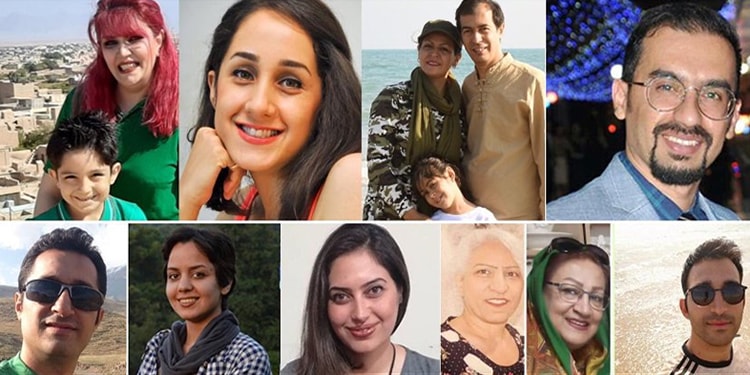Source: www.hra-news.org

HRANA ‒ The Court of Appeals of Fars Province sentenced four Baha’i citizens living in Shiraz ‒ Farham Sabet, Farzan Masoumi, Shahnaz Sabet and Soheila Haghighat ‒ to a total of eight years in prison. Earlier, eight other Baha’is in this case were sentenced by the Court of Appeals to a total of 25 years and six months in prison and a fine of one million tomans ( approx. $237). In this case, ultimately a total of 12 Baha’i citizens living in Shiraz were sentenced by the Court of Appeals to a total of 33 years and six months in prison and a fine of one million tomans.
According to HRANA, the news agency of Human Rights Activists in Iran, the Court of Appeals of Fars Province sentenced four Baha’i citizens living in Shiraz ‒ Farham Sabet, Farzan Masoumi, Shahnaz Sabet and Soheila Haghighat ‒ to a total of eight years in prison. According to this sentence, Farham Sabet, Farzan Masoumi, Shahnaz Sabet and Soheila Haghighat were each sentenced to 2 years in prison.
These individuals were initially sentenced by the First Branch of the Shiraz Revolutionary Court, headed by Judge Seyyed Mahmoud Sadati, to six years in prison each on charges of “propaganda activities against the regime and membership in opposition groups.” According to Article 134 of the Islamic Penal Code, the maximum punishment, which is five years in prison, could be imposed on these citizens on the charge of “membership in opposition groups”.
In another report this evening, HRANA reported that seven other Baha’is had been sentenced in this case by the Fars Province Court of Appeals to a total of 19 years and six months in prison and a fine of one million tomans.
According to this sentence, Niloufar Hakimi was sentenced to five years and nine months of imprisonment, Navid Bazmandegan, Bahareh Ghaderi, Noora Pourmoradian, Soodabeh Haghighat, Elahe Samizadeh to two years and nine months each, and Ehsanollah Mahboub Rah-Vafa to a fine of one million tomans.
In the primary stage, the First Branch of the Shiraz Revolutionary Court, presided over by Judge Seyed Mahmoud Sadati, sentenced Niloufar Hakimi to eight years in prison, Navid Bazmandegan, Bahareh Ghaderi, Noora Pourmoradian, Soodabeh Haghighat and Elahe Samizadeh, on charges of “propaganda activities against the regime and membership in opposition groups,” to six years in prison each, and Ehsanullah Mahboub Rah-Vafa to one year in prison.
Among these people, in the second stage of her court case, Elahe Samizadeh was sentenced by Branch 105 of the Shiraz Criminal Court to an additional one year of prison and two years of being banned from receiving government and public services. In addition, Niloufar Hakimi was also sentenced to five years in prison by the criminal court.
Soheila Haghighat, Shahnaz Sabet, Farzan Masoumi, Farham Sabet and Shahriar Atrian, five other Baha’i citizens living in Shiraz, were previously sentenced by the First Branch of the Shiraz Revolutionary Court to six years in prison each on charges of “propaganda activities against the regime and membership in opposition groups”. Among these people, Soheila Haghighat was also waiting for the trial of her other case in the criminal court. The status of this part of Ms. Haghighat’s case was unknown at the time of the preparation of this report. Previously, the Court of Appeals of Fars Province upheld the conviction of Baha’i Shahriar Atrian with no change, without holding a court hearing.
In this case, 12 Baha’i citizens living in Shiraz were finally sentenced by the Court of Appeals to a total of 33 years and 6 months in prison and a fine of one million tomans.
These citizens were detained by security forces in Shiraz during the years 2016 to 2019 and were later released on bail pending trial.
Baha’is in Iran are deprived of freedom to practice their religious beliefs. This systematic deprivation of liberty occurs even though Article 18 of the Universal Declaration of Human Rights and Article 18 of the International Covenant on Civil and Political Rights entitle any individual to freedom of religion and belief as well as freedom to express it individually or collectively, in public or in private.
According to unofficial sources, there are more than 300,000 Baha’is in Iran, but Iran’s constitution only recognizes Islam, Christianity, Judaism, and Zoroastrianism and does not recognize the Baha’i Faith. For this reason, the rights of Baha’is in Iran have been systematically violated for many years.
July 25, 2020 12:15 pm
This monstrous persecution of the Baha’i community is a cancer on the skin of this regime many Baha’i have been murdered imprisoned denied autonomy, freedom of expression, denied the right to an education or a voice denied life😡